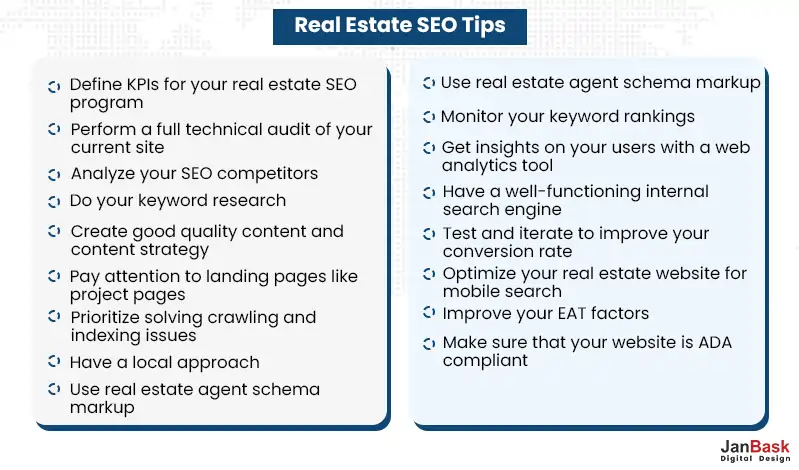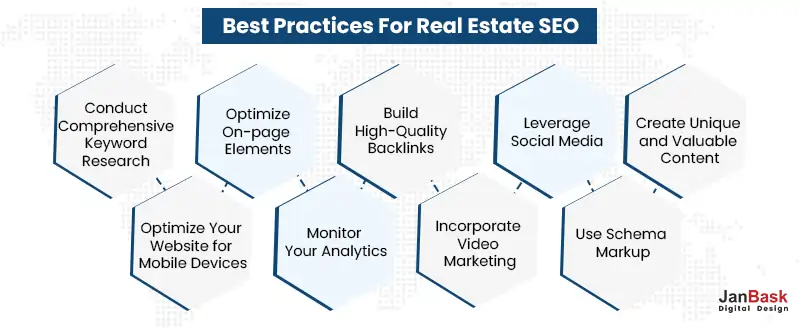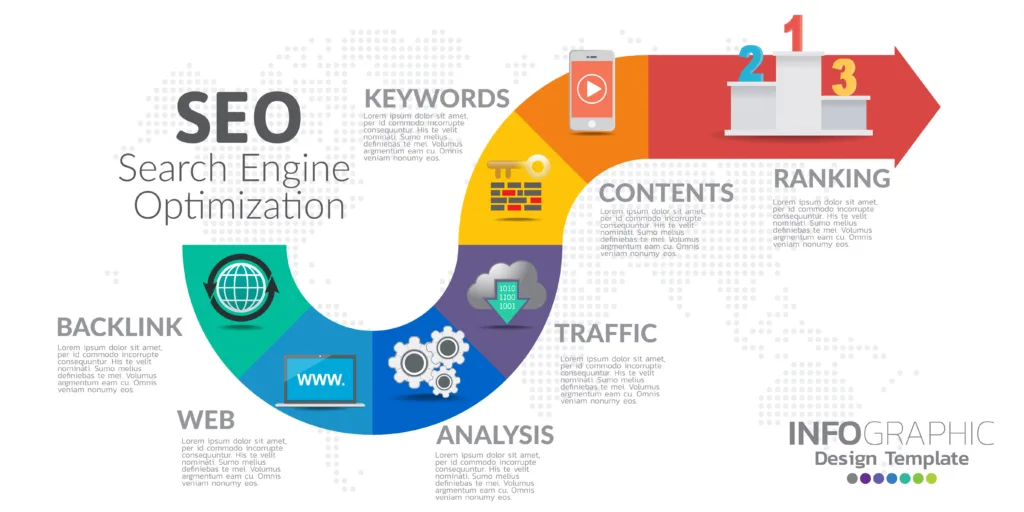Unleash the power of SEO for real estate success with these 20 essential tips seasoned realtors swear by.

Image courtesy of via DALL-E 3
Table of Contents
Introduction to SEO for Realtors
SEO, or Search Engine Optimization, is an essential tool for real estate professionals like Realtors. SEO helps real estate agents improve their online visibility and attract more buyers and sellers. In simple terms, SEO is about making your website and online content more visible to people searching for real estate services on search engines like Google. By understanding and implementing SEO strategies, Realtors can enhance their online presence and reach a wider audience in the competitive real estate market.
What is SEO?
SEO stands for Search Engine Optimization, which means optimizing your online content so that it appears higher in search engine results. When someone searches for properties or real estate services online, they are likely to click on the websites that appear at the top of the search results. SEO helps Realtors achieve higher rankings by using relevant keywords, creating quality content, and optimizing their websites for search engines. For example, if a Realtor specializes in luxury homes in Los Angeles, they would use keywords like “luxury homes in Los Angeles” to attract potential buyers looking for similar properties.
Why Realtors Need SEO
Realtors need SEO to connect with potential clients who are searching for real estate services online. With the majority of home buyers and sellers starting their search on the internet, having a strong online presence is crucial for Realtors to stay competitive. By implementing SEO strategies, Realtors can increase their visibility, attract more website traffic, and ultimately generate more leads. Whether it’s optimizing property listings, creating informative blog posts, or building backlinks, SEO plays a crucial role in helping Realtors grow their business in the digital age.
Choosing the Right Keywords
Keywords are like special words that help search engines like Google understand what your website is about. When you use the right keywords, your website can rank higher in search results, making it easier for potential buyers and sellers to find you. Let’s dive into how realtors can choose the best keywords for their business.
Understanding Keywords
Keywords are the words or phrases that people type into search engines when looking for something online. For real estate, good keywords could be ‘houses for sale in [your city]’ or ‘top real estate agents near me.’ These keywords should be relevant to what you offer and what people are searching for in your area.
Finding Long-Tail Keywords
Long-tail keywords are longer and more specific phrases that people use when they are closer to making a decision. For example, ‘3-bedroom house with backyard in [your neighborhood]’ is a long-tail keyword. These keywords can help you target a more specific audience and stand out in a crowded market.
Creating High-Quality Content
When it comes to creating high-quality content for your real estate website, writing informative blog posts can be a game-changer. Blog posts are a fantastic way to provide valuable information to your audience and establish yourself as a knowledgeable realtor. For example, you can write posts about the local real estate market trends, home staging tips, or the home buying process. By sharing your expertise through blog posts, you can attract and engage potential buyers and sellers.

Image courtesy of www.janbaskdigitaldesign.com via Google Images
Optimizing Property Listings
Another essential aspect of creating high-quality content as a realtor is optimizing your property listings. When potential buyers are searching for properties online, you want your listings to stand out and be easy to find. Make sure to include detailed descriptions, high-quality photos, and relevant keywords in your listings. Additionally, consider adding virtual tours or videos to give viewers a better sense of the property. By optimizing your property listings, you can attract more interested buyers and increase your chances of making a sale.
Using Social Media
Social media platforms like Facebook, Twitter, and Instagram can be powerful tools for realtors looking to boost their SEO and reach a wider audience. By sharing valuable content and engaging with followers, real estate professionals can increase their online visibility and attract more potential clients.
Sharing Content on Social Platforms
When realtors share their blog posts, property listings, and other relevant content on social media, they can reach a larger audience and drive more traffic to their website. By using platforms like Facebook and Instagram, real estate professionals can showcase their listings, provide helpful tips and advice, and create a strong online presence.
Engaging with Followers
It’s essential for realtors to engage with their followers on social media by responding to comments, messages, and inquiries. By actively participating in conversations and keeping followers engaged, real estate professionals can build relationships, establish trust, and ultimately convert leads into clients. Consistent engagement also signals to search engines that the content is valuable and relevant, which can positively impact SEO rankings.
Building Backlinks
Building backlinks is an essential aspect of SEO for realtors. Backlinks play a crucial role in improving a realtor’s website authority and visibility in search engine results. In simple terms, backlinks are like digital referrals from other websites to yours. The more quality backlinks your website has, the more Google sees it as a reliable and trustworthy source of information.

Image courtesy of www.janbaskdigitaldesign.com via Google Images
What Are Backlinks?
Imagine you are talking to a friend about finding a new home, and they recommend a real estate website they found helpful. That recommendation is like a backlink. It shows Google that your website is valuable enough for others to recommend it to their connections. Backlinks are links from one website to another, and they help search engines discover new pages and determine how well a page should rank in search results.
Strategies to Earn Backlinks
Getting backlinks may sound complex, but there are simple ways realtors can earn them. One effective strategy is to create high-quality content that others naturally want to link to. For example, writing informative blog posts about real estate trends or creating engaging property listings can attract backlinks from other websites looking to share valuable information with their audience.
Another way to earn backlinks is through outreach. Reach out to industry influencers, real estate bloggers, or local businesses and ask them to link back to your website. Demonstrating the value of your content and how it can benefit their audience can encourage others to reference your website in their own articles or posts.
Optimizing Website Speed
When it comes to your real estate website, speed matters more than you might think. A fast-loading website not only keeps your visitors happy but also plays a crucial role in improving your search engine ranking. Let’s dive into why website speed is essential and explore some simple tips to help you optimize your website for speed.
Why Speed Matters
Imagine you’re searching for a new home online, and you click on a real estate website only to find that it takes forever to load. Frustrating, right? Well, that frustration is shared by most online users. Studies have shown that visitors quickly lose interest in a website that takes more than a few seconds to load. A slow website can lead to high bounce rates, lower user engagement, and a negative impact on your search engine ranking.
Tips to Improve Speed
Now that we understand the importance of website speed let’s explore some easy tips to make sure your real estate website loads quickly:
1. Optimize images: Large image files can slow down your website significantly. Make sure to compress images without compromising quality to reduce load times.
2. Minimize plugins: While plugins can add functionality to your website, having too many can bog down its performance. Remove unnecessary plugins and ensure the ones you need are regularly updated.
3. Enable browser caching: Browser caching allows repeat visitors to load your website faster by storing certain elements locally. This helps reduce load times for users who have previously visited your site.
4. Compress files: Enable file compression to reduce the size of CSS, HTML, and JavaScript files. This can help your website load faster, especially on mobile devices with slower internet connections.
By implementing these simple tips, you can ensure that your real estate website loads quickly, keeping your visitors engaged and improving your SEO performance.
Local SEO Techniques
When potential buyers and sellers are looking for real estate services, they often start their search locally. This is where Local SEO, or Search Engine Optimization, comes into play. By utilizing Local SEO techniques, realtors can enhance their online presence in their specific geographic area and attract more clients. Let’s delve into some essential strategies for realtors to boost their local visibility.

Image courtesy of www.janbaskdigitaldesign.com via Google Images
Using Google My Business
One of the most powerful tools for local SEO is Google My Business. This free service allows realtors to create a business profile that appears in local search results and Google Maps. By setting up a Google My Business listing with accurate and up-to-date information, realtors can improve their chances of being found by potential clients in their area.
Encouraging Customer Reviews
Customer reviews play a significant role in local SEO. Positive reviews not only build credibility and trust with potential clients but also signal to search engines that a realtor’s business is reputable. Encourage satisfied clients to leave reviews on platforms like Google, Yelp, and Facebook. These reviews will not only attract more local clients but also boost the realtor’s visibility in local search results.
Measuring SEO Success
When it comes to SEO success, it’s essential for realtors to keep track of key metrics to understand how their efforts are performing. One crucial metric to monitor is website traffic, which shows how many people are visiting the realtor’s website. Another important metric is keyword rankings, which indicate how high the realtor’s website is appearing in search results for specific keywords.
Tools for Tracking Performance
To make the task of measuring SEO success easier, realtors can utilize various tools available online. Google Analytics is a popular tool that provides detailed insights into website traffic, user behavior, and keyword performance. Another helpful tool is SEMrush, which offers a comprehensive suite of SEO tools to track keyword rankings, backlinks, and more. By using these tools, realtors can gain valuable insights into their SEO performance and make informed decisions to improve their online presence.
Conclusion: Summary and Next Steps
After exploring the world of SEO for realtors, it’s clear that Search Engine Optimization is a powerful tool that can help real estate professionals like you connect with more buyers and sellers online. By implementing the tips and strategies outlined in this guide, you can take your digital presence to the next level and stand out in a competitive market.

Image courtesy of digitalneighbor.com via Google Images
Summary
Throughout this guide, we have covered the fundamentals of SEO for real estate, including the importance of choosing the right keywords, creating high-quality content, utilizing social media, building backlinks, optimizing website speed, implementing local SEO techniques, and measuring SEO success. By mastering these essential tips, you can improve your online visibility, attract more clients, and ultimately grow your business.
Next Steps
Now that you have a solid understanding of SEO for realtors, it’s time to put your knowledge into action. Here are some next steps you can take to enhance your SEO strategy:
- Keyword Research: Continuously research and update your keywords to stay relevant in search results.
- Create Compelling Content: Regularly produce informative blog posts and engaging property listings to keep your audience interested.
- Engage on Social Media: Interact with your followers, share valuable content, and build relationships on platforms like Facebook and Instagram.
- Build Quality Backlinks: Seek opportunities to earn backlinks from reputable websites to boost your authority and credibility.
- Optimize Website Speed: Monitor and optimize your website speed to ensure a seamless user experience and improve your search rankings.
- Utilize Local SEO: Take advantage of Google My Business and encourage customer reviews to attract local clients.
- Track Your Performance: Use analytics tools to measure your SEO success and make data-driven decisions to refine your strategy.
By continuously refining and optimizing your SEO efforts, you can position yourself as a top real estate professional in your market and drive more traffic and leads to your business. Remember, SEO is an ongoing process, so stay dedicated and consistent in your efforts to see lasting results. Good luck!
Want to turn these SEO insights into real results? Seorocket is an all-in-one AI SEO solution that uses the power of AI to analyze your competition and craft high-ranking content.
Seorocket offers a suite of powerful tools, including a Keyword Researcher to find the most profitable keywords, an AI Writer to generate unique and Google-friendly content, and an Automatic Publisher to schedule and publish your content directly to your website. Plus, you’ll get real-time performance tracking so you can see exactly what’s working and make adjustments as needed.
Stop just reading about SEO – take action with Seorocket and skyrocket your search rankings today. Sign up for a free trial and see the difference Seorocket can make for your website!
Frequently Asked Questions (FAQs)
1. What is SEO and why is it important for realtors?
SEO stands for Search Engine Optimization. It involves making adjustments to your real estate website and content so that search engines like Google can easily find and rank your site. This is crucial for realtors because it helps them attract more potential buyers and sellers online. By using SEO techniques, realtors can increase their visibility and reach a larger audience, ultimately leading to more business opportunities.
2. How do I choose the right keywords for my real estate business?
Choosing the right keywords is essential for your SEO strategy. Start by understanding what keywords are relevant to your industry, such as “real estate agent” or “homes for sale.” You can use tools like Google Keyword Planner to research and identify popular keywords in the real estate market. Additionally, consider using long-tail keywords, which are more specific phrases that potential clients might use in their search queries, like “3-bedroom house for sale in Los Angeles.”
3. How can I create high-quality content to attract more clients?
Creating high-quality content is key to engaging with potential clients and improving your SEO. Start by writing informative blog posts that provide value to your audience. Share tips on buying or selling homes, neighborhood guides, or market trends. When optimizing property listings, make sure to include detailed descriptions, high-quality images, and relevant keywords to make them more appealing to potential buyers.
4. How can social media help boost my SEO as a realtor?
Social media platforms like Facebook, Twitter, and Instagram can play a significant role in boosting your SEO efforts. By sharing your real estate content on social media, you can reach a wider audience and drive traffic back to your website. Engage with your followers by responding to comments, sharing valuable information, and showcasing your expertise in the real estate industry. This can help improve your online visibility and credibility with search engines.
5. What are backlinks, and why are they important for SEO?
Backlinks are links from other websites that direct users to your site. They are crucial for SEO because search engines like Google consider backlinks as a vote of confidence in your content. When reputable websites link back to your site, it signals to search engines that your site is trustworthy and authoritative. To earn backlinks, you can collaborate with other real estate professionals, guest post on industry blogs, or create shareable content that naturally attracts links.
6. How does website speed impact SEO, and what can I do to improve it?
Website speed plays a crucial role in SEO and user experience. A fast-loading website not only keeps visitors happy but also helps search engines crawl and index your site more efficiently. To improve website speed, you can optimize images, reduce server response time, enable browser caching, and minimize the use of redirects. By implementing these simple tips, you can ensure that your real estate website loads quickly and ranks higher in search results.
7. How can I use local SEO techniques to attract clients in my area?
Local SEO focuses on optimizing your online presence to target customers in a specific geographic area. One effective way to do this as a realtor is by using Google My Business to create and optimize your business listing. Make sure to include accurate contact information, business hours, and photos of your real estate properties. Encourage satisfied clients to leave positive reviews, as these can also boost your visibility in local search results. By implementing these strategies, you can attract more clients in your area and establish your presence in the local real estate market.
8. How can I measure the success of my SEO efforts as a realtor?
To track the performance of your SEO strategy, you need to understand key metrics like website traffic, keyword rankings, and conversion rates. Google Analytics is a powerful tool that can help you monitor and analyze these metrics. By regularly reviewing your SEO performance, you can identify what is working well and make adjustments to improve your strategy. Additionally, consider using other tracking tools like SEMrush or Moz to gain insights into your website’s SEO performance and make data-driven decisions to enhance your online presence.







